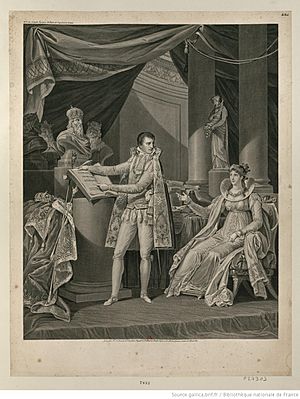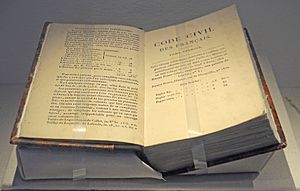Napoleonic Code facts for kids
The Napoleonic Code ‒ or Code Napoléon, officially the Code civil des Français ‒ is the French civil code established under Napoléon I in 1804. Four judges wrote the Code for Napoleon, to replace the many different kinds of law in different places. It did not allow privileges based on birth (such as nobility), established equality before the law and secured the right to property. It allowed freedom of religion. It also set up a system of Civil service where government jobs would go to the most qualified.
Due to the Napoleonic Wars the Napoleonic code became an influence on most of Europe. In particular, it influenced countries such as Italy, Spain, Portugal, Latin American countries, the province of Quebec and the state of Louisiana in the United States. It influenced all other former French colonies which base their civil law systems on the Napoleonic Code. The code of 1804:
- Simplified administration division
- Abolished feudal system
- Removed guild restrictions in towns
- Gave privileges to businessmen, industrialists and professionals
- The privileges were the right to equality,freedom and property
- Transportation and communication were improved
- Introduced a uniform system of measurement
See also
 In Spanish: Código Civil de Francia para niños
In Spanish: Código Civil de Francia para niños



